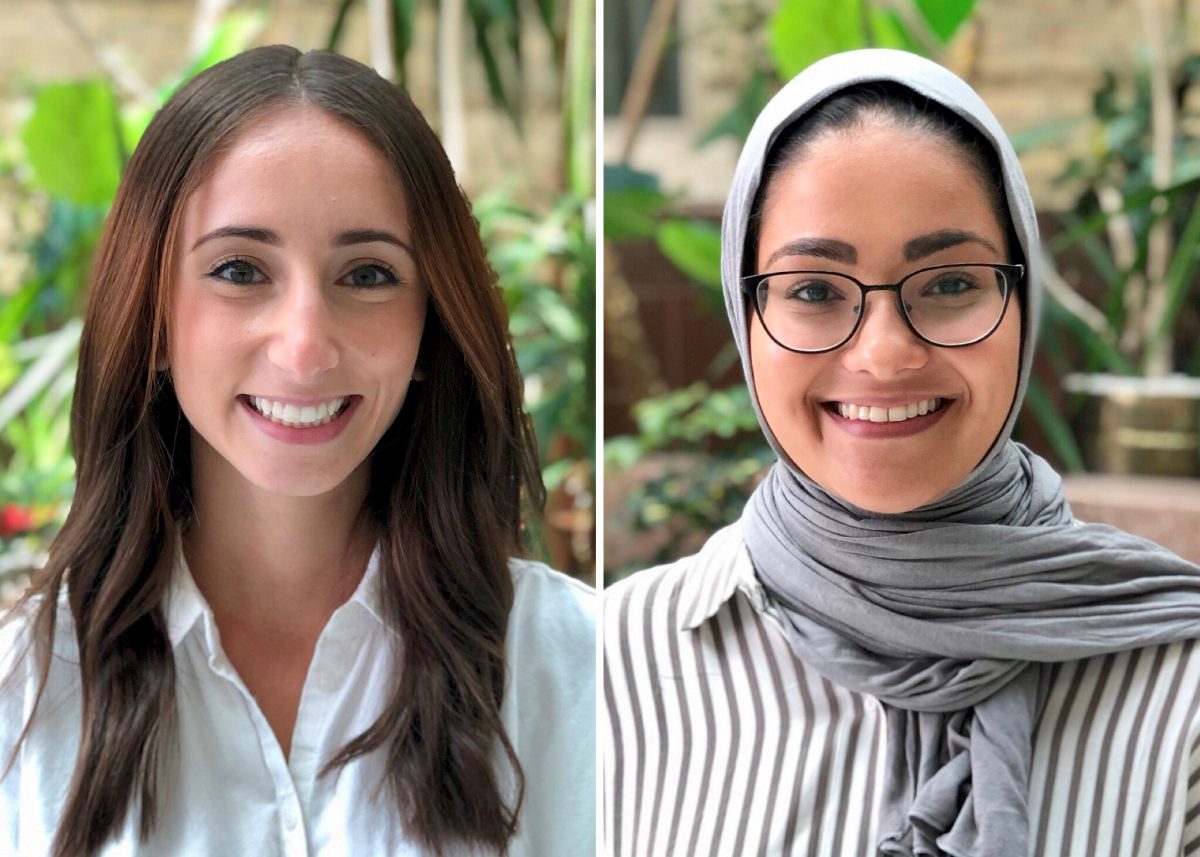
Dentistry students Nina Cianflone (left) and Yasmin Elzayat took part in the bachelor of science in dentistry program.
Dentistry students pursue their passions through summer research
Dentistry students Yasmin Elzayat and Nina Cianflone already know what areas of dentistry interest them – and through the bachelor of science in dentistry program they were able to pursue their passions through research in community-based dentistry and oral health.
The program, known as B.Sc. (Dent.), provides students in the Dr. Gerald Niznick College of Dentistry, Rady Faculty of Health Sciences, the chance to spend two summers absorbed in life as a researcher.
For Elzayat, a fourth-year doctor of dental medicine (DMD) student, her research project aimed to determine the oral health status and the most common dental procedures performed on refugees who’ve recently arrived to Canada.
“I think it’s important as oral health care professionals to understand the populations we are serving,” she said. “As the number of refugees here in Winnipeg continues to grow, it’s important to know what the oral health needs of refugees are in order to know how to best serve them.”
For Cianflone, a fourth-year DMD student, she is fascinated by oral health and its relationship with the rest of the body. She pursued a research project that aligned with her interests. Cianflone’s research looked at the surgical outcomes of using the anterior hip bone as a source of graft material for the repair of cleft palate defects.
“Within the confines of my study, it appears that this surgery goes well for patients,” she said. “About 90 per cent of patients had no complications at the graft donor site, and even there the complications that they did experience were relatively minor. I think that it’s always nice to see that what’s being used is working.”
Dr. Raj Bhullar, associate dean (research), Dr. Gerald Niznick College of Dentistry, said the B.Sc. (Dent.) program allows students to see whether they want to specialize in a particular area of dentistry. And if they want to specialize in the area that interests them, the research experience gives students an advantage when applying to specialty programs after dental school, he said.
“It looks good on their CV and it also opens up their minds to research,” he said.
Elzayat said the experience has definitely opened her mind to conducting research after becoming a dentist. “It is something I continue to be interested in,” she said. “So as I continue to grow as a professional, I do see myself doing some form of research in the future.”
The students’ work is supervised by professors, and Cianflone said that having mentors guide her through the research process has been helpful. “When you start in research as a student, everything is so unknown,” she said. “It can be intimidating at first, but being able to work with a supervisor hand-in-hand and have them guide you makes the process that much easier. Overall, I’ve learnt that research can be exciting and is not as intimidating as it may appear on the surface.”
The program, which 19 students were enrolled in this summer, benefits the professors as well, Bhullar said. It allows the professors the chance to try out new ideas in the form of short research projects. The projects are designed so there will be a result at the end of the two summers. Students have the option of enrolling in the program at the end of their first or second year of dental school.
As well as research experience, the students receive a $5,000 stipend each summer of the program. “It’s nice that the program also offers financial compensation for your time,” Cianflone said. “If students are concerned about not being able to work while completing their project over the summer, there’s compensation.”
At the end of the program, the students turn in a mini-thesis and give a presentation outlining the project results. The college provides some financial support for students to attend a national meeting to present their findings. Bhullar said that students have won awards at these meetings in the past, which allowed them to travel to international events to present their research.
Bhullar said the U of M’s B.Sc. (Dent.) program is a model that has been used by other universities in Canada to develop a bachelor of science in dentistry program at their institution.






